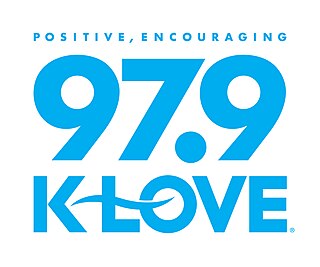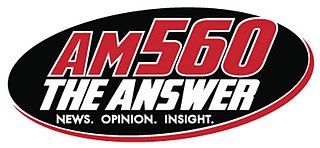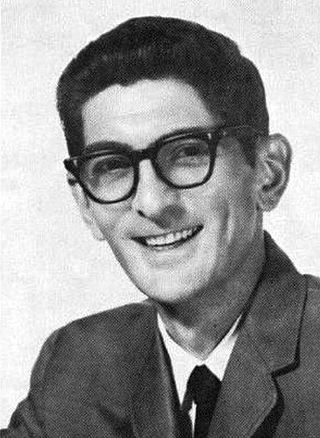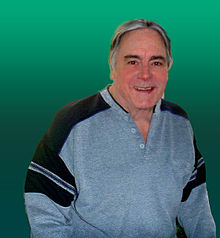
WLS is a commercial AM radio station in Chicago, Illinois. Owned by Cumulus Media, through licensee Radio License Holdings LLC, the station airs a talk radio format. WLS studios are in the NBC Tower on North Columbus Drive in the city's Streeterville neighborhood. The station's programming is also available in the Chicago metropolitan area via a simulcast on the HD2 digital subchannel of sister station WLS-FM.

Larry Lujack, also called Superjock, Lawrence of Chicago, Charming and Delightful Ol' Uncle Lar, and King of the Corn Belt, was a Top 40 music radio disc jockey who was well known for his world-weary sarcastic style. Some of his more popular routines included Klunk Letter of the Day, the darkly humorous Animal Stories with sidekick Tommy Edwards as Little Tommy, and the Cheap Trashy Show Biz Report.

WMVP is a commercial radio station licensed to Chicago, Illinois, carrying a sports radio format. Owned by Good Karma Brands, the station serves the Chicago metropolitan area as the market affiliate of ESPN Radio, the flagship station of the Chicago Bears, Chicago White Sox, and the Chicago Wolves and is the home of local personalities David Kaplan, Tom Waddle and John Jurkovic. Formerly an ESPN Radio owned-and-operated station, WMVP's studios are co-located with WLS-TV in the Chicago Loop while the transmitter is located in Downers Grove. In addition to a standard analog transmission, WMVP is simulcast over the second HD subchannel of WTBC-FM and is available online.

WCKL is a non-commercial FM radio station licensed to Chicago, Illinois, featuring a Christian contemporary format via the K-Love network. Owned and operated by Educational Media Foundation (EMF), WCKL serves the Chicago metro area with a transmitter located atop the John Hancock Center.
Marvin Jay Cohen, better known by his broadcast name of Jay Marvin was a retired American liberal radio talk show host and writer. Former WLS-AM & FM talk show host Jay Marvin has died. That's according to his wife Mary. Posted on FACEBOOK Chicago's WLS Radio History Marvin began his radio career in 1971 as a country music DJ at KWMC in Del Rio, Texas. After that, he worked at various stations including WWOD Lynchburg, Virginia, K102 FM El Paso, Texas, WHBQ in Memphis, WJEZ and WJJD Chicago, Illinois, and KKAT Salt Lake City, Utah, and Top 40 station KIXZ in Amarillo, Texas. He switched to talk radio in the late 1980s starting at WTKN St. Petersburg, Florida and then moved to WFLA in Tampa. From there, he moved to WTMJ Milwaukee, Wisconsin, WLS Chicago (twice), and KHOW and KKZN in Denver, Colorado. He has also guest hosted nationally for Ed Schultz, Jerry Springer, and Alan Colmes.

WLS-FM is a commercial classic hits radio station licensed to serve Chicago, Illinois. Owned by Cumulus Media, the station serves the Chicago metropolitan area, and is the radio home of Dave Fogel. The WLS-FM studios are located at the NBC Tower in the city's Streeterville neighborhood, while its transmitter is located at Willis Tower.

WKSC-FM – branded "103.5 Kiss FM" – is a commercial Top 40/CHR radio station licensed to Chicago, Illinois. Owned by iHeartMedia, its studios are located at the Illinois Center complex on Michigan Avenue in Downtown Chicago, and its transmitter is located at Willis Tower. WKSC is the flagship station of the syndicated morning show The Fred Show.

WKQX is a commercial radio station licensed to Chicago, Illinois, featuring an alternative rock format known as "Q101". Owned by Cumulus Media, the station serves the Chicago metropolitan area. WKQX's studios are located in the NBC Tower, while the station transmits from atop the John Hancock Center. In addition to a standard analog transmission, WKQX broadcasts over two HD Radio channels.

WCFS-FM – branded Newsradio 105.9 WBBM – is a commercial all-news radio station licensed to the Chicago suburb of Elmwood Park, Illinois. Owned by Audacy, Inc., the station services the Chicago metropolitan area, operating as a full-time simulcast of WBBM.

WIND is a commercial AM radio station licensed to Chicago, Illinois, and broadcasting a conservative talk radio format. It is owned by the Salem Media Group with studios on NW Point Boulevard in Elk Grove Village.
Morning zoo is a format of morning radio show common to English-language radio broadcasting. The name is derived from the wackiness and zaniness of the activities, segments, and overall personality of the show and its hosts. The morning zoo concept and name is most often deployed on Top 40 (CHR) radio stations.

KOLA is a commercial radio station licensed to San Bernardino, California, and broadcasting to the Riverside-San Bernardino-Inland Empire radio market. It is owned by the Anaheim Broadcasting Corporation and it airs a classic hits radio format. Its studios are on Orange Tree Lane in Redlands, California.

Edward R. Salamon is an American entertainment industry executive and radio broadcaster. He is credited as one of the people who led to country music becoming a major force in the mid-1990s. He was dubbed “country radio’s most influential programmer” while programming WHN, New York, which became the most listened to country radio station of all time in the mid-1970s, an accomplishment that led to his induction into the Country Radio Hall of Fame in 2006.

Richard Orlando Biondi was an American Top 40 and oldies disc jockey. Calling himself The Wild I-tralian, he was one of the original "screamers," known for his screaming delivery as well as wild antics on and off the air. In a 1988 interview, Biondi said he had been fired 23 times, with both fits of temper and jokes gone wrong part of the tally. Over many years and many frequencies, Dick's closing line was, "God bless, bye, bye, Duke. Thanks a million for dialing our way."
John Records Landecker is an American Top40/oldies disc jockey with a trademark saying "Records truly is my middle name" who created Boogie Check, Americana Panorama, and satirical songs and bits based on current events such as "Make a Date with the Watergate", and "Press My Conference". He first retired from radio broadcasting on July 31, 2015. Boogie Check was the last humorous feature Landecker did each night on his show for about two minutes. A string of brief telephone calls was put on the air in rapid succession. From July 2007 through June 2012, he hosted "Into the Seventies", a syndicated weekend radio program from TKO Radio Networks.

Jimmy Pearson Staggs, also known as Jim Stagg, was an American disc jockey and record store owner in Chicago, Illinois.

Melvyn Phillips is an American writer who writes the post MelPhillipsradioviews.com. He is a regular contributor to "Vox Jox". In the 1970s, he programmed radio stations WOR-FM, WXLO and WNBC, New York, WRKO AM&FM, Boston and KQV, Pittsburgh. He was general manager of Hooper Radio and had worked in various disc jockey positions in Tampa, Nashville, Norfolk and Atlantic City in the 1960s.
Marion Elbridge Herrington, best known as Captain Mikey, was an American disc jockey; voice-over actor, who was the national voice for Sears; and innovative radio program director, who "pioneered album-oriented rock formats at San Jose's KOME and Los Angeles' KMET", and was described as "one of the very best programmers in Top 40 radio as well as what we called progressive rock on FM."
"Rock Me" is a song by the Canadian-American hard rock band Steppenwolf. It was released on their 1969 album At Your Birthday Party. It was written by the band's lead singer John Kay, and was the band's fifth American single release. The song was produced by Gabriel Mekler and released as a single in 1969, originally as the B-side to "Jupiter Child", but the sides were later flipped. It peaked at #10 on the Hot 100 on April 19, 1969 and #6 on both WLS and WCFL. It was both Billboard's and Cashbox's top debut the week of March 1, 1969. The song is considered the highlight of the album though it had been released for the soundtrack well ahead of the album. The song followed on the heels of the band's two 1968 hits, "Born to Be Wild" which peaked at #2 and "Magic Carpet Ride" which peaked at #3. Cash Box particularly praised the "pulverizing vocal performance."
Harold James O'Halloran was an American radio announcer and a singer.













